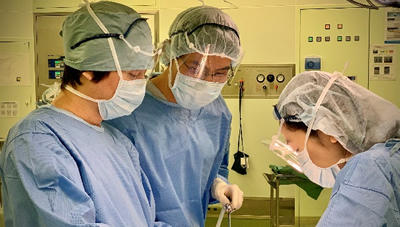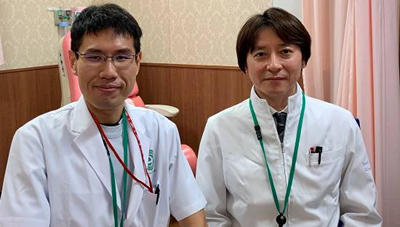School of Medicine at Narita
Faculty of Medicine
Clinical Clerkship Reports 2021

Supervisor report: IUHW Mita Hospital, Gynecology, Manager Prof. Kazu Ueda
What do you expect student to do and to understand during the clinical clerkship?
Our department expects and supports students to apply the knowledge, which they have gained during their three years in classroom lectures, in clinical practice. In addition to knowledge, we like them to understand the importance of communication with patients and medical staff. In particular, we would like you to understand that using the appropriate language when interacting with patients and considering how they perceive their illness and what they are worried about is a necessary part of the process of building a trusting relationship.
Was there any particular occasion when you felt the achievement of students’ three years of study?
Through outpatient care, surgery and courses, I think that students have a good basic knowledge of each disease. I also believe that they have developed the habit of self-study.
What did you feel our medical students were unique compared to medical students from other universities?
My first impression of our medical students is that they have a very serious attitude towards practical training. I also have the impression that they have acquired a high level of English and communication skills through the English language education and multi-professional training that are the characteristics of our university.
Were there any occasions in which you felt that students were able to make use of what they had learned about medicine in English?
I had an impression that medical English words came out of their mouth smoothly rather than Japanese. Students also used PubMed when researching something, such as citing an English paper as a reference when writing a report.
How were the international students?
They are very fluent in Japanese and have a good understanding of Japanese culture and customs, so I did not feel any hurdles from their nationalities. I was surprised by their motivation and their ability to answer questions from us.
What would you like to say to exam candidates?
I know that studying medicine in English is not easy, but I am sure that it will help you in the future. I also think that having friends of different nationalities and origins will help to deepen your understanding of others. Challenging difficult things is also a necessary element for the qualities of a future doctor. Please take the exam as the first step.

Student report: Masao Hayashi
What does a day in clinical clerkship look like?
In the case of surgery, such as gynecology and vascular surgery, we spend the whole day in the operating theatre, either observing or assisting. On non-surgical days, as in the case of internal medicine, we see the outpatients after morning rounds. During the rest of the day, we take small lectures, training in techniques and medical record keeping, and we may be asked to present a case study of an assigned patient at a conference.
Was there any particular occasion when you felt the achievement of students’ three years of study?
By combining the "How to read a paper" in the second year with the "How to criticize a paper" in the third year, I was able to think scientifically about the efficacy and risks of tests and treatments used in clinical practice using papers. In addition, I was able to use how to build rapport with patients and how to be close to them, which I learned in the Medical Professions class, as the basis for my interactions with hospitalized patients.
Were there any occasions when you felt the achievement of the integrated clinical teaching?
The integrated clinical teaching of the different diseases (pathogenesis, symptoms, investigations, treatment), which we learned, was directly applicable to the practical training. In practice, when I recorded a patient's condition, I first looked back at my notes and then, if necessary, I learned more specialized knowledge from technical books and guidelines.
Did you find any differences between what you learned at university and what you do in the field?
I felt the difference between theory and practice. There are very few patients whose typical symptoms match, so it was important for me to understand how to relate their various conditions to my previous medical knowledge. In addition, as in the classroom, the findings are rarely given clearly from the outset, so in the actual interview it was necessary to think about how to interpret the patient's complaints and what medical findings correspond to them.
What is the most memorable experience you have had with a patient?
Every patient was very kind and answered my questions very carefully. I was very happy to receive warm support after my interview. I deeply feel that we grow up as medical professionals under the watchful eyes of not only the professors of the university but also many other people who are involved in hospital.
What was your memorable experience with the other medical professions?
During my clinical training, I had many opportunities to get information from different professionals. I was able to learn more about the day to day living conditions of hospitalized patients from the nurses and about the assessment of motor function from the physiotherapists. I am aware that it is important to exchange information with multiple professionals in order to get a complete picture of a patient.
Were there any occasions you felt you "grew up" during your clinical clerkship?
It is said that it is desirable to interview patients every day during the clinical training. At the beginning, I only asked medical questions in one direction, but through trial and error, I gradually became able to talk to patients while adapting to their thoughts and concerns.
How much time did you spend on preparation and revision during your clinical training?
Basically, I always set aside one to two hours for my study every day. If I had to prepare case summaries or case presentations, or if I had additional assignments, I would add more time as necessary.
About the environment during the clinical training (location of the hospital, living environment, living conditions, etc.)
Both IUHW Mita Hospital and IUHW Ichikawa Hospital were close to the nearest train station and I could commute by train from my home in Tokyo. At IUHW Atami Hospital, I was able to use the dormitory. The dormitory at Atami Hospital was fully furnished and there was a bus service from the dormitory to the hospital, so there was no difficulty in getting around.
How did you spend your time off during your clinical clerkship?
I refrained from going out for protecting myself against coronavirus infection, but I attended online study groups and studied other fields, such as reading books that interested me, away from medicine. I also tried to keep up with my exercise routine by doing some indoor training.



